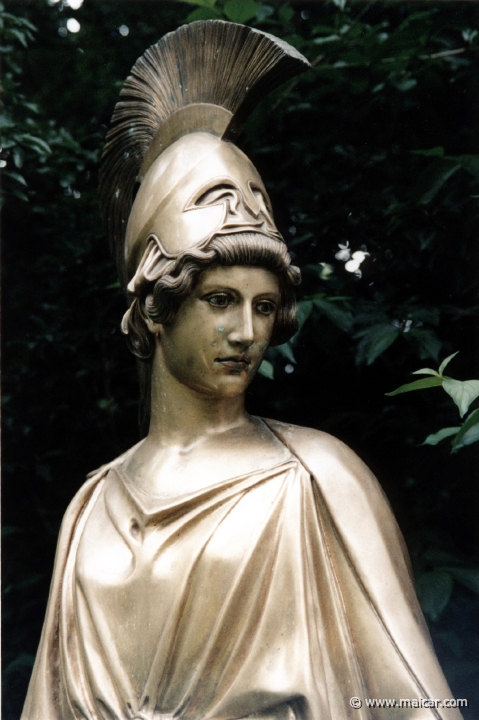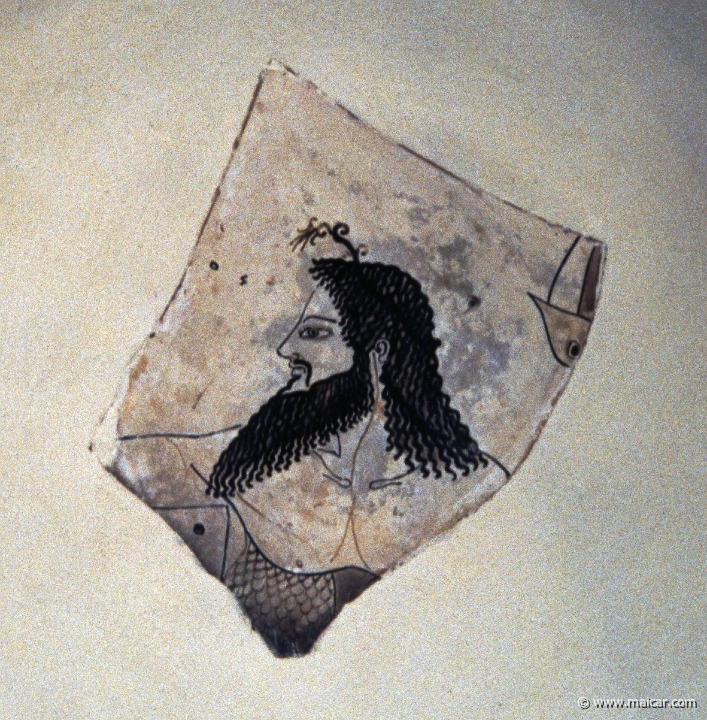|

|
Athena. 1001: Reconstruction of a lost bronze group from Acropolis. Städtische Galerie-Liebighaus, Museum alter Plastik, Frankfurt.
|
|
|
"Voice of Athena, dearest to me of the gods, how clearly, though you are unseen, do I hear your call and snatch its meaning in my mind." (Odysseus. Sophocles, Ajax 14).
"A day can press down all human things, and a day can raise them up. But the gods embrace men of sense and abhor the evil." (Athena to Odysseus. Sophocles, Ajax 130).
|
|
Wisdom of Athena
Bright-eyed Athena, who has been called the mind of god, is the goddess of prudent intelligence, her share of wisdom having been given to her by Zeus. She is able to bestow command, skill and courage, and also victory in war for those who revere justice and listen to her persuasive tongue, or destruction for the unjust. For these reasons it has always been desirable to count upon her favor when war is at hand, for Athena, it is said, would never put up with defeat. And yet she checks the insolence of those whose spirit is violent and unjust.
Skill and Justice
Having brought out the olive-tree from a rock, Athena introduced its cultivation, and also the making of clothing, carpentry and other arts, being the protectress of all crafts, a privilege she shares with Hephaestus. That is why she also is a goddess promoting prosperity for all those who, while making flourish the fruits of the earth, cherish justice and know how to live a sorrowless life. Such are Athena's blessings and that is why she, who for being wise is also just, instructs thus:
"If you always greatly honor with kindness the kindly ones, you will surely be preeminent, keeping your land and city in the straight path of justice." (Athena. Aeschylus, Eumenides 992).
Manly goddess
Athena presided the first court which tried a case of homicide, the murder of Clytaemnestra by her son Orestes 2, establishing a permanent tribunal in Athens. This goddess, who generally prefers to see most things from a manly point of view, acquitted Orestes 2, for she deemed Clytaemnestra's crime, killing her husband, to be greater than that of Orestes 2, killing her mother Clytaemnestra in order to avenge his father Agamemnon.
"There was no mother who gave me birth; and in all things, except for marriage, wholeheartedly I am for the male and entirely on the father's side. Therefore, I will not award greater honor to the death of a woman who killed her husband, the master of the house." (Athena to the court. Aeschylus, Eumenides 734).
Birth
When Zeus was full-grown, he consorted first with the Oceanid Metis 1, who tried to avoid him, turning into many shapes. Some say that it was Metis 1 who, in order to help Zeus against his father Cronos, gave to the latter a drug that forced him to disgorge his own children, whom he had swallowed. But others say that it was Gaia who administered this drug. However, there was a prophecy, uttered by Uranus and Gaia, which said that Metis 1, who was wisest among the gods (for she was possessed by wisdom or was wisdom itself), would give birth to a son who should become the lord of heaven. This is why Zeus, fearing to lose the power which he only recently had acquired as ruler of the universe, swallowed her while she was pregnant. And when the time came for the birth to take place, Prometheus 1 (or else Hephaestus) smote the head of Zeus with an axe, and Athena, fully armed, came out of the top of his head at the river Triton in Libya. This is how Athena was born, but the Libyans say otherwise (see Parentage below).
Childhood
It is told that Athena was brought up by the Boeotian Alalcomeneus, but according to the Arcadians, Athena was handed over to Pallas 2 by Zeus as soon as she was born, and reared by him till she grew up. Others affirm that Athena was brought up by Triton (the son of Poseidon and Amphitrite), whose body, as far as the belly, was like that of the gods, but had a tail of a sea-monster. During her childhood, Athena, while playing with another girl called Pallas 3, killed her accidentally during one of their games, and being grieved for her death, Athena made a wooden image in her likeness, which was called the Palladium.
Athens adjudged to Athena
It was in the time of King Cecrops 1, the first king of Attica, that Athens was adjudged to Athena, when she produced the olive-tree. Since then Athena has been the patroness of Athens, and she has been called the mother, the mistress, and the guardian of the city (more details about the circumstances around Athens being adjudged may be read at Poseidon).
Virgin goddess and birth of Erichthonius 2
According to some, Hephaestus, who is akin to Athena because he also protects the crafts, attempted to rape this virgin goddess, and when she was escaping he dropped his seed on Athena's leg whereupon she, in disgust, wiped off the seed with wool and threw it on the ground. And from the seed which fell on the ground as the goddess fled, Erichthonius 2, whose body's lower part was snake formed, was produced. Creusa 1 (daughter of Erechtheus, son of Pandion 2, son of Erichthonius 2) thought something similar, for when her son Ion 1 asked her about Erichthonius 2 she answered:
Ion 1: And did Athena take him up from the earth?
Creusa 1: Into her virgin hands; she was not his mother. (Euripides, Ion 269).
Still others have said that Erichthonius 2, who later became king of Athens, was a son of the soil (see AUTOCHTHONOUS). In any case, Athena is said to have brought Erichthonius 2 up unknown to the other gods, hiding the child in a chest, which she gave to the daughters of King Cecrops 1 of Athens to guard. But the girls opened the chest, and a crow gave the secret away, and the sisters, driven mad by the goddess, threw themselves into the sea (more details at Envy).
Promised wages should be respected
Athena caused Alcinoe 2 to fall in love with another man and leave husband and children; this she did to avenge a woman named Nicandra who had come to spin for Alcinoe 2. Having worked for a year Nicandra was turned out of the house without receiving the full wages Alcinoe 2 had promised to give her.
Gods and mortals cannot be compared
Arachne, who had gained Fame in the Lydian towns for her skill in the art of spinning and weaving wool, thought she could compete with Athena in that art, but being defeated she was turned into a spider by Athena (see Arachne).
Helping to heal
|

|
Triton: said to have brought up Athena. 6510: Head of Triton in fragment of a white- ground kylikes. Early 5C BC. Archaeological Museum of Eleusis.
|
|
Asclepius, the great healer, received from Athena the blood that flowed from the veins of Medusa 1, and while he used the blood that flowed from the veins on the left side for the bane of mankind, he used the blood that flowed from the right side for salvation, and by that means he was able to raise the dead.
The Judgement of Paris
It is told that the shepherd Paris (who afterwards turned into a prince and through the abduction of a woman caused the Trojan War and the ruin of his country), once made a Judgement on Mount Ida, by which an award of beauty, consisting in the golden apple of Eris, was granted to Aphrodite. The goddesses who lost the contest were Athena and Hera, for Paris rejected their gifts and instead accepted Aphrodite's bribe, which was the hand of Helen. However,some believe that there never took place such a judgement, and that Helen and Paris just fell in love without divine intervention, except the normal one in these cases. They reason that neither Hera nor Athena had any motive to come to Phrygia in order to contest a palm of beauty awarded by a shepherd, since Hera cannot hope of winning a better husband than Zeus, and Athena is known for disliking marriage.
The will to punish Troy
It has often been remarked that Paris, through his judgement, earned the eternal enmity of both Hera and Athena, not only against himself, but also against his family and his whole country. And this has been proved by the way these goddesses sought to punish the Trojans during the war, and to utterly destroy the city and the house of King Priam 1 of Troy. This is how these goddesses converse with each other about Hector 1, when he was defeating the Achaeans in the battlefield:
Hera : See what Hector has done to the Achaeans already. And now there is no stopping him in his mad career.
Athena : Nothing could please me more than to see that mad career cut short and have him killed on his native soil by Achaean hands. (Homer, Iliad 8.350).
Athena wounded by unknown Arcadian
When the powerful Achaean fleet which sailed against Troy to demand the restoration of Helen and the property that Paris had stolen was still in Aulis (the harbor opposite the island of Euboea where the fleet gathered), Athena was involved in a dispute that injured her. For Teuthis from Arcadia, who had joined the army, had a quarrel with Agamemnon at Aulis, and because of it he returned home. But before leaving, Athena tried to persuade him to go to war, and then he wounded her in the thigh.
Stays Achilles' anger
When the dispute started between King Agamemnon and Achilles concerning the latter's sweetheart Briseis, whom the king threatened to take away from him, Achilles was very close to draw his sword and kill Agamemnon, but then Athena came down from heaven, and appearing to him alone and seizing him by his hair, prevented him from attacking the king. And when he protested, she told him:
"I have come from heaven to stay your anger ... Three times as many glorious gifts shall be yours on account of the king's arrogance. But refrain, and obey me." (Athena to Achilles. Homer, Iliad 1.208).
Leads Hector 1 to destruction
Athena was present in many occasions during the Trojan War, helping the Achaeans, for she never forgave the seducer Paris, nor his family and country, nor the humiliation she suffered on Mount Ida, when he judged in favor of Aphrodite.
In the last year of the war, when Achilles sought Hector 1 in order to kill him and avenge the death of his dear friend Patroclus 1, she came to help him. The duel between the two heroes looked like a race, Achilles pursuing Hector 1, who had lost his courage, round the walls of Troy. As Achilles could not catch him, Athena, assuming the shape of Hector 1's brother Deiphobus 1, appeared to persuade him of facing Achilles. "Together," she encouraged him, and then Hector 1, believing he was supported by his brother, faced his enemy only to discover that he was alone. So he was killed by Achilles.
- Spoils the returns of the Achaeans
But once Troy was taken, Athena decided to impose on the Achaeans a bitter return, because the outrage that Ajax 2 committed in Athena's shrine when he raped the seeress Cassandra, was never punished by the Achaeans. That is why all kind of calamities afflicted them during their return from Troy, suffering storms at sea, shipwreck and death. But she felt pity for Odysseus, and helped him during his wanderings, so that he could return to Ithaca. (See also Map: The Returns.)